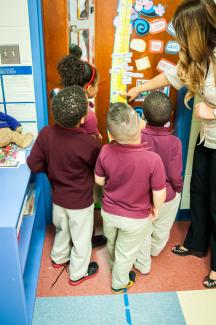
Early Childhood Education and leadership in schools
July 28, 2015
By Eleanor J. Shirley, MA, CSW, Nebraska Department of Education, Office of Early Childhood. In October of 2013, Eleanor was appointed Director of the Nebraska Early Childhood Quality Rating and Improvement System, Step Up to Quality, legislated by the Nebraska Unicameral in June 2013. Prior to October 1, 2013, she served as Director of the Nebraska Head Start-State Collaboration Office for nearly 16 years building and bridging systems in early care and education across federal, state, and local early childhood programs and services. She administered the federal Even Start Family Literacy program across the state and serves as Ombudsman for Nebraska Department of Education. In previous years, her scope of social work practice included various programs and initiatives that address the needs of children and their families, particularly children birth to age 8, and their families who may be challenged due to economic disadvantage.
Recently, many educational leaders from across the country attended the Early Childhood Roundtable, an annual convergence of CEELO, ECE SCASS, and the National Association of Early Childhood Specialists in State Departments of Education (aka, the “Specialists”) meetings. Dr. Steve Tozer, UIC, Center for Urban Education Leadership, expounded upon school leadership. He said, “School leadership is second only to classroom instruction in making a difference in wall-to-wall school learning and outcomes.” Steve hit home that socio-economic issues may be predominant, but should not become an excuse for poor learning outcomes. He cited Bryk, Sebring, et al (2010) and Bryk, Gomez, et al (2015) to help us expand our understanding regarding the essentials to organize schools for improvement, and the leadership that it takes to do so.
Another recent event that I attended was the BUILD, National QRIS Conference in Baltimore. It was a mix of early childhood leaders all engaged in implementing state quality rating and improvement systems. Lea Austin, Ed.D., UC Berkeley, closing plenary speaker, and co-author of Leadership in Early Childhood: A Curriculum for Emerging and Established Agents of Change, focused on re-conceptualizing leadership in the field of early care and education. She urged us to ask ourselves tough questions. Do we have the right leaders in place? Do they represent the diverse perspectives of the populations we serve? Do we have data related to current and potential leadership? What does this imply about our workforce? She said, “We need more voices to get us out of our echo chamber.”

In my professional journey, I studied leadership theory and various models of leadership development, and have facilitated professional leadership development activities. In recent years, it was my privilege to be included in leadership development in our state education agency. At the Nebraska Department of Education (NDE), we adapted McREL‘s model of “balanced leadership,” initially designed to develop principal leadership in public schools. Our SEA adaptation was intended to help the Department further support school administrators in continued leadership thinking and doing. It has been an honor to serve in various roles at NDE, and bring to bear upon my practice my own discipline in social work, adult and vocational education, and social policy and planning. I’m the first to admit my perspectives are a bit different from the typical educator or administrator. My knowledge and experience helps me reflect on interests of the adult humans doing early childhood work and remembering it’s ultimately about positive outcomes for children.
Thinking back on the national events, I would nudge us to hone in on the human agenda when we consider leadership development. My observations are that we, intentionally, or not, use words that are militaristic, competitive, and industrial in tone. We talk about getting people in the pipeline, levers of change, drilling into the data, strategizing and strategic planning, and calibrating, and recalibrating as if it is the only way to facilitate change in adults, children, and families!
My personal belief is that we cannot make people change. We can be with them, model, and influence their intrinsic desire to change. With that belief, I grapple with the ongoing search for, and vision regarding, the human element in leadership development, especially in early childhood. We are so inundated and daunted by standards and assessments that we may forget about the needs and persuasions of the grown-up humans who are helping little humans in their knowing and growing.
Why not consider leadership development as an opportunity to facilitate values clarification? Why not challenge individuals’ beliefs by inviting them into authentic dialogue? Why not focus on relationship-building by influencing and modeling rather than directing and dogmatic strategies? Why not consider cross-discipline leadership to expand our thinking and doing?
By understanding the science and art of human systems and interactions and valuing the diverse talents of others, we can develop leadership with the parallel respect that we have for young children. Maybe the essentials of leadership in schools to support early care and education are those of relationship-building, reflective practice, and demonstrated respect for the diverse needs of children and families in our communities. Together we can get our voices out of the echo chamber and back into strong and sustainable early childhood leadership, literally ‘leading’ to better programs and best possible outcomes for children.
About NIEER
The National Institute for Early Education Research (NIEER) at the Graduate School of Education, Rutgers University, New Brunswick, NJ, conducts and disseminates independent research and analysis to inform early childhood education policy.
